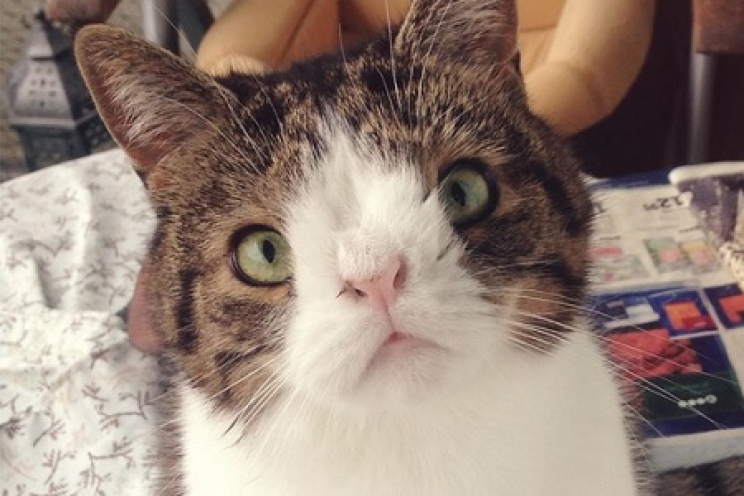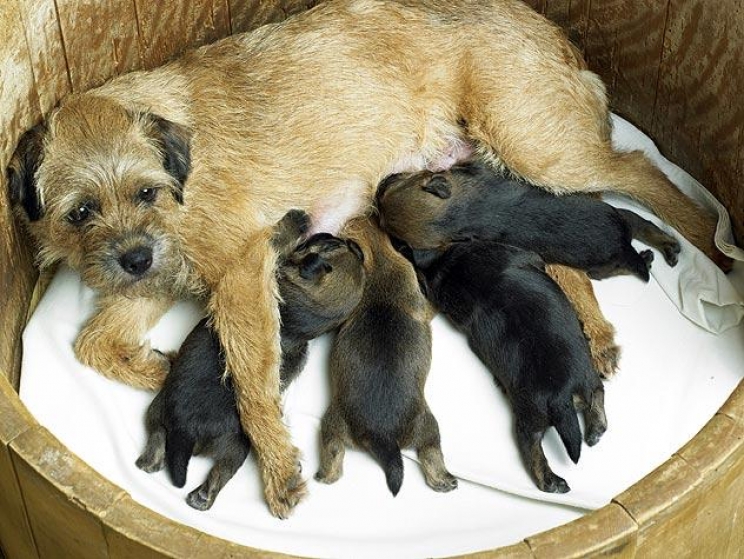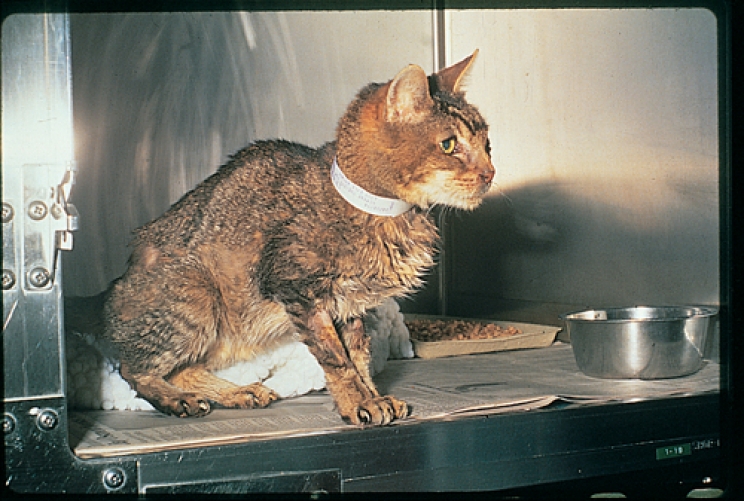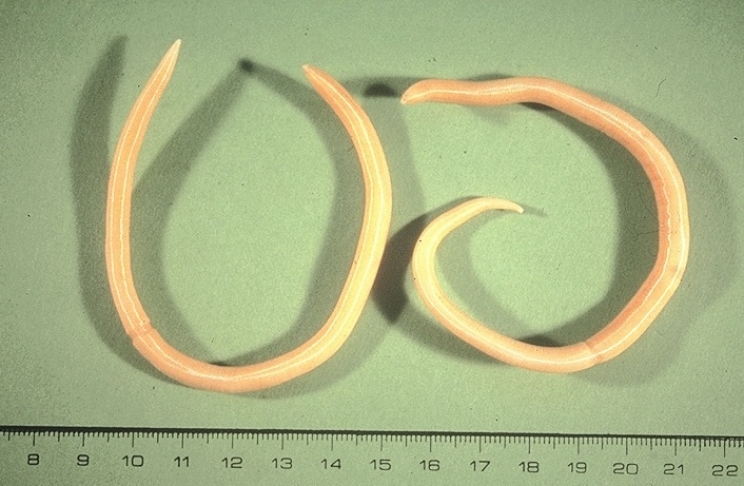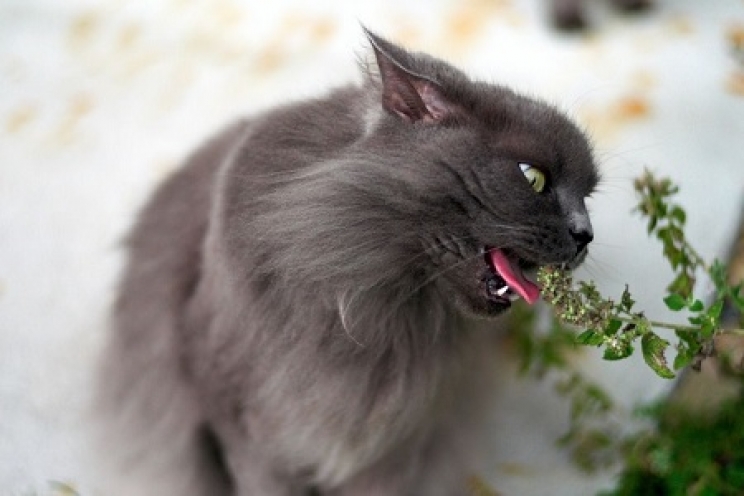Animals are very curious, especially when they are still puppies. It may happen that they ignore most of the quality foods we offer them, and then choose the leaves of our favourite plant as an appetizing snack. Some of these, however, are really very dangerous for our four-legged friends. Here are the toxic and poisonous plants for dogs and cats.
The most common toxic plants
We speak above all of the plants commonly found in our homes. Among the main ones we find:
- Holly: the rounded and bright red berries make holly one of the most common Christmas plants, together with the Christmas star (see below). Potentially, all parts of Holly can be toxic, but in particular berries and leaves, which are rich in irritating saponins and substances that reduce the presence of oxygen in the blood. Ingestion mainly leads to vomiting, diarrhoea, increased salivation and abdominal pain, up to coma and death;
- Azalea: the ingestion of azalea leaves can cause serious gastrointestinal irritations, which are manifested by vomiting, diarrhea and increased salivation, but also by neurological symptoms, leading to weakness and drowsiness, up to coma and death;
- khalanchoe: the ingestion of the sheet pile is capable of causing gastrointestinal irritation and serious heart problems, with possible arrhythmias;
- Cyclamen: the roots are the most dangerous part of this plant. Ingestion causes very intense vomiting and gastrointestinal irritation, which can lead to death if they are not treated in time;
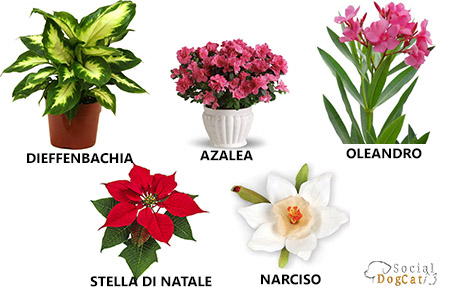
-
Dieffenbachia: also commonly known as Mother-in-law, Dieffenbachia is widespread in our homes. If ingested, but also only in contact with its leaves, it can cause serious irritation, often similar to allergic reactions. Inside, in fact, there are dangerous substances, such as oxalic acid or calcium oxalates, capable of causing vomiting, diarrhea, increased salivation, abdominal pain, irritation and swelling of the mouth and all the digestive system , tiredness, depression;
-
Ivy: very common in gardens, if ingested it can mainly cause gastrointestinal irritations, with vomiting and diarrhea, while at higher doses it can also cause neurological, cardiac and respiratory problems;
-
Lily: some varieties are toxic to cats, such as Lilium Candidum, Tigrinum, Regale, Orientalis, Longiflorum, Speciosum, Lancifolium and Hemerocallis, whilst the climbing lily appears to be harmless. Two hours after ingestion, it causes gastrointestinal symptoms and weakness, while after several days the effects of a very serious kidney failure begin to appear, with increased thirst and tiredness;
-
Thrush: causes irritation to stomach and intestines, as well as heart damage;
-
Narcissus: this beautiful plant with yellow or white bell-shaped flowers can cause intoxication problems if the animal ingests the bulb or the water in which the flowers were placed. In addition to gastrointestinal irritation, it can cause serious heart problems, lowering blood pressure and slowing your heart rate. It is generally not lethal;
-
Oleander: the toxicity of the oleander is one of the best known. All parts of the plant, if ingested, can cause gastrointestinal irritations, heart problems, hypothermia - or lower body temperature - and in some cases even the death of the animal;
-
Castor: the most sensitive dogs to ingestion the castor oil or seeds will exhibit a sharp increase in body temperature within 24 hours, accompanied by vomiting, thirst, diarrhea, colic and death in 2-3 days.
-
Christmas star: common name of Poinsettia or Euphorbia pulcherrima. It is a plant very present in most of our homes, especially during the Christmas period, because of its bright red leaves, which are well suited to the atmosphere of the holidays. If ingested, the Poinsettia is capable of causing serious gastrointestinal irritations, which are manifested by vomiting, diarrhea, increased salivation and abdominal pain. Intoxication generally does not cause very serious damage, when compared to other dangerous plants;
-
Tulip: the tulip bulb causes vomiting, diarrhea, increased salivation, up to heart problems, tiredness, felling and convulsions. Particular attention should be paid especially if the animal has a tendency to dig holes in the garden.
Other plants that mainly cause gastrointestinal symptoms include:
- Beautiful at night
- Caladium
- Ficus
- Philodendron
- Wisteria
- Horse chestnut
- Iris
- Monstera
- Thrush
- Ortensia
- Pothos
- Bird of Paradise
- Mistletoe
Perhaps not everyone knows, but among the plants toxic to animals, Nicotiana tabacum - the common cigarette tobacco - and Cannabis sativa, also known as Marijuana, one of the most common substances, should be included. Intoxication occurs mainly with the ingestion of the leaves and flowers of the plant, rarely through the inhalation of smoke.
Cannabis sativa contains particular active substances on the brain, normally looked for by those who use it for recreational purposes. The effects above all include weakness, drowsiness, tachycardia, urinary and faecal incontinence, often alternating with excitement and aggression. In most cases the effects disappear within 24-72 hours.
Tobacco is rich in nicotine, a substance that acts in a very particular way on the nervous system. Less than an hour after the ingestion of tobacco, the animal shows signs of hyperactivity, is restless, breathing becomes faster and may begin to lose saliva from the mouth. Vomiting is always present, especially if the ingested dose is low, while when it is high, it can be accompanied by more serious symptoms, up to convulsions and coma.
What to do in case of intoxication
If you have witnessed the ingestion of the plant with your own eyes, immediately take the dog or cat to another room. Clearly, the first thing to do is to contact your veterinarian, telling him which plant it is. Then rely on his instructions or take him immediately to his clinic.
One of the most important strategies in case of ingestion of plants and toxic substances is to make the animal vomit. The strategies for achieving this effect are different, starting with hydrogen peroxide or salt. In any case, it is good to strictly follow the veterinarian's instructions. If you do not have the opportunity to go to the nearest clinic or clinic within a few minutes, contact him by phone and ask how you could intervene in the meantime.
We remind you to avoid the administration of milk, because, contrary to popular opinion, it is not the ideal antidote to any type of intoxication. On the contrary, it can even promote the absorption of some fat-soluble toxic substances, that is, those that dissolve better in fats.

